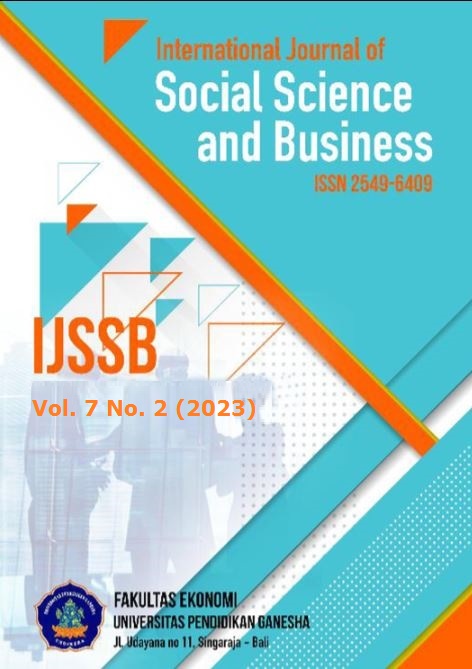The Emotional Quotient Competence and Tri Hita Karana Culture Moderating the Influence of Task Complexity towards the Auditor Performance
DOI:
https://doi.org/10.23887/ijssb.v7i2.55359Keywords:
harmony (Tri Hita Karana ), Auditor IndependenceAbstract
Challenges in auditor performance with increasing task complexity result in a decrease in the quality of auditor performance. The research aimed at proofing the emotional quotient competence and Tri Hita Karana culture in moderating the influence of task complexity on auditor performance. The population of this research was the auditor at the Public Accountant Office in Bali. The sample was chosen using a purposive sampling technique. The data analysis used SEM-PLS (Structural Equation Modeling-Partial Least Square) assisted by the software SmartPLS Version 3. The result of the research shows that the complexity of the task influences negatively significant towards the auditor's performance. The task complexity influences dominantly towards the auditor's performance. The emotional quotient influences positively significant towards the auditor's performance. The culture of Tri Hita Karana influences positively significant towards the auditor performance. The emotional quotient significantly moderates the complex influences of tasks on the auditor's performance. More specifically, the emotional quotient weakens the negative influence of task complexity on auditor performance. The culture of Tri Hita Karana significantly moderates the influence of task complexity on auditor performance. Specifically, the culture of Tri Hita Karana weakens the negative influence of task complexity on auditor performance. The implication of this study is the importance of improving emotional intelligence skills and the implementation of Tri Hita Karana culture as supporting factors to improve auditor performance in facing task complexity.
References
Abdullah, M. (2015). Metodelogi Penelitian Kuantitatif. Yogyakarta: Aswaja Pressindo.
Abdurrahman, Mulyono. 2010. Pendidikan Bagi Anak Berkesulitan Belajar. Jakarta: Rineka Cipta.
Arifin, Mediaty, Arifuddin, & Karim, R. A. (2018). The Effect of Time Budget Pressure and Task Complexity on the Performance of Government Internal Auditors with Emotional Intelligence as Moderation Variables. International Journal of Advanced Engineering Research and Science (IJAERS), 5(8), 138-151 DOI: https://doi.org/10.22161/ijaers.5.8.19
Autry, C. W., Daugherty, P.J., 2003. Warehouse operation employees: linking person-organization fit, job satisfaction and coping response. Journal of Business Logistic, Vol. 24, 1, 171-197. DOI: https://doi.org/10.1002/j.2158-1592.2003.tb00036.x
Boynton, W. C., Johnson, R. N., & Kell, W. G. (2015). Modern Auditing jilid 1 (edisi 7). Jakarta: Penerbit Erlangga.
Dea Endraning Oktaviani, & Kartika Pradana Suryatimur. (2022). Pentingnya Pengelolaan Kecerdasan Emosional Terhadap Kinerja Seorang Auditor. Jurnal Cakrawala Ilmiah; Vol. 1 No. 5: Januari 2022; 1009-1014 ; 2808-1668 ; 2808-1757.
Eisenhardt, Kathleem. (1989). Agency Theory: An Assessment and Review. Academy of Management Review, 14. Hal 57-74. DOI: https://doi.org/10.5465/amr.1989.4279003
Gasendi, K. E., Herawati, N. T., & Atmadja, D. A. T. (2017). Pengaruh Kompleksitas Tugas, Orientasi Tujuan dan Self-Efficacy terhadap Kinerja Auditor (Studi pada Kantor Akuntan Publik di Semarang). E-Journal S1 Ak Universitas Pendidikan Ganesha Jurusan Akuntansi Program S1, 8(2), 123.
Ghozali, I., & Latan, H. (2015). Partial Least Square Konsep Teknik dan Aplikasi Menggunakan Program SmartPLS 3.0 (2nd Edition). Badan Penerbit Universitas Diponegoro.
Govindarajan, V.J. and Gupta, A.K. (1985). ”Linking Control Systems to Business Unit Strategy: Impact on Performance”, Accounting, Organisations and Society, 10(1), pp. 51–66. DOI: https://doi.org/10.1016/0361-3682(85)90031-5
Goleman, D. 2000. “Emotional Intelligence”. PT. Gramedia Pustaka Utama. Jakarta.
Hair, J. F., Ringle, C. M., & Sarstedt, M. (2013). Partial Least Squares Structural Equation Modeling: Rirogous Applications, Better Result and Higher Acceptance. Long Range Planning, 46(2013), 1-12. DOI: https://doi.org/10.1016/j.lrp.2013.01.001
Ishak, P. (2018). Pengaruh Independensi Auditor, Emotional Intelligence, Spiritual Intelligence Terhadap Perilaku Etis Auditor dan Kinerja Auditor. ATESTASI : Jurnal Ilmiah Akuntansi, 1(1), 85–98. https://doi.org/10.33096/atestasi.v1i1.63 DOI: https://doi.org/10.33096/atestasi.v1i1.63
Kohlberg, L. 1995. Tahap-tahap Perkembangan Moral. Diterjemahkan Oleh John De Santo dan Cremers A. Yogyakarta: Kanisius.
Locke, E.A. dan Latham, G.P. (1996), “Goal Setting Theory: An Introduction. Dalam Steers, Porter, dan Bigley”, Motivation and Leadership at Work, 95-121. New York: McGraw-Hill Companies. Inc.
Ni Luh Yuli Sudiartini, & Ni Putu Sri Harta Mimba. (2018). Pengaruh Locus of Control dan Budaya Organisasi berbasis Tri Hita Karana pada Kinerja Badan Pengawas. E-Jurnal Akuntansi, 381–407. DOI: https://doi.org/10.24843/EJA.2018.v22.i01.p15
Prena, G. Das, & Evitasari, A. (2019). Budaya Tri Hita Karana Sebagai Pemoderasi Pengaruh External Locus of Control Terhadap Kinerja Auditor: Studi Pada Kantor Akuntan Publik Se-Provinsi Bali. Jurnal Ilmiah Akuntansi Dan Bisnis, 4(1), 38. https://doi.org/10.38043/jiab.v4i1.2149 DOI: https://doi.org/10.38043/jiab.v4i1.2149
Robbins, Stephen P. 2001. Perilaku Organisasi: Konsep, Kontroversi, Aplikasi, Jilid 1, Edisi 8, Prenhallindo, Jakarta.
Setya Dharma, N. B., & Rasmini, N. K. (2022). Workplace spirituality Memoderasi Pengaruh kompleksitas Tugas Dan Locus of control pada kinerja auditor. E-Jurnal Ekonomi Dan Bisnis Universitas Udayana, 729. https://doi.org/10.24843/eeb.2022.v11.i06.p09 DOI: https://doi.org/10.24843/EEB.2022.v11.i06.p09
Susanti, N. K. A., & Sujana, I. K. (2019). Pengaruh Time Budget Pressure , Komitmen Organisasi , Pemahaman Good Governance dan Kompleksitas TugasPada Kinerja Auditor Fakultas Ekonomi dan Bisnis Universitas Udayana ( Unud ), Bali , Indonesia PENDAHULUAN Tuntutan masyarakat akan penyelenggaraan peme. 28, 1059–1087. DOI: https://doi.org/10.24843/EJA.2019.v28.i02.p11
Tenaya, Gede Agus Indra. 2007. Analisis Falsafah dan Konsep Akuntansi dalam Perspektif Filsafat Kultur Bali Tri Hita Karana dan Kesadaran Internal Lembaga terhadap Hukum Perusahaan. Tesis Program Pascasarjana Universitas Brawijaya, Malang.
Downloads
Published
How to Cite
Issue
Section
License
Copyright (c) 2022 Juliantara I Komang

This work is licensed under a Creative Commons Attribution-ShareAlike 4.0 International License.











